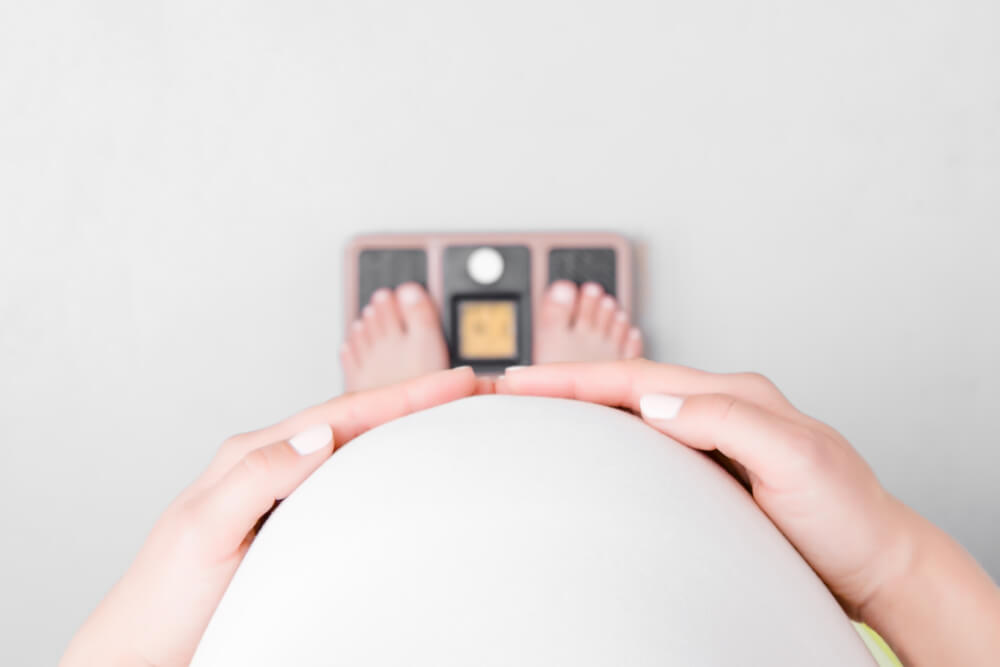Pregnancy weight gain is inevitable, but there are limits to what is considered “normal” weight gain. This expert-reviewed article will teach you about managing your weight during pregnancy, what doctors recommend, and what to do if you gain too much.
That said, you will always want to consult a professional at a reliable clinic for weight management during pregnancy. The guidance of a trained professional will help you determine the right calories for your daily needs and the proper growth of your unborn baby.
So, how much weight gain is normal during pregnancy? What are some things to look out for when altering your eating regime? Keep on reading to find out.
Pregnancy Weight Gain: What to Expect
According to the findings, for a healthy pregnancy, most expecting mothers should gain anywhere between 25 to 35 pounds or 11.5 to 16 kilograms. In most cases, women will gain between two to four pounds or one to two kilograms during the first weeks of pregnancy. After the first trimester, women typically gain one pound or half a kilogram per week for the remainder of the pregnancy. The overall weight gain in pregnancy will depend on the woman and the situation. For example:
- Women who are overweight should gain less weight (seven to 11 kilograms or less or 15 to 25 pounds).
- Underweight women should gain more weight (13 to 18 kilograms or around 27 to 40 pounds).
- If you have multiple births, you need to gain more weight. Women with twins require an additional 16.5 to 24.5 kilograms or 37 to 54 pounds.
As you can see, pregnancy weight gain will depend on the mother’s weight before pregnancy, as well as specific scenarios (such as multiple births). Overall, healthy pregnancy and weight gain will revolve around a balanced and nutrient-dense diet. Here are the rough caloric estimates for most expecting mothers:
- 1,800 calories daily in the first trimester.
- 2,200 calories daily in the second trimester.
- 2,400 calories daily in the third trimester.
One of the most common misconceptions regarding weight gain in pregnancy is that you should “eat for two.” Although most women require more extra calories for the proper development of the fetus, moderation is key. The average expecting mother requires only approximately 300 calories more per day than she did before entering pregnancy. A slight caloric surplus will aid in healthy pregnancy weight and keep obesity-related illnesses at bay.
We advise consulting a trained professional such as Dr. David Adler for precise and custom-tailored guidance related to your health and the well-being of your unborn child. Remember, your calories may vary, and you may require more or fewer calories than what is noted above.

Pregnancy Weight: Where Does it Go?
Now that you are aware of how much you should be consuming for a healthy pregnancy, you may be asking: “where does the weight go?”. Here are some rough estimates of how pregnancy weight is distributed on the body:
- Baby: Eight pounds
- Amniotic fluid: Two to three pounds
- Placenta: Two to three pounds
- Blood supply: Four pounds
- Breast tissue: Two to three pounds
- Larger uterus: Two to five pounds
- Stored fat for breastfeeding and delivery: Five to nine pounds.
Overall, the estimated weight gain in pregnancy is a total of 25 to 35 pounds. Again, this amount may vary from one woman to the next.
Weight Management During Pregnancy: How to Do it Right
You know how much weight gain is normal during pregnancy, but how can you manage it without risking weight-related diseases? Here are some guidelines and general rules to follow to ensure healthy weight gain and a seamless pregnancy.
Manage Your Weight Before Getting Pregnant
Some women may be overweight, while others are underweight when already pregnant. Talk to your doctor to adjust your calories for a healthy pregnancy. However, ensure to avoid dieting during pregnancy, as this can cause damage to the unborn fetus.
Focus on a Nutrient-Dense Diet
Consuming the right foods and staying active is the ideal formula for a healthy pregnancy. If you need help with diet and weight management during pregnancy, consult your healthcare provider and a specialized nutritionist.
Some healthy food choices you should consume:
- Fresh vegetables and fruits are full of vitamins and low in calories (such as cucumbers, tomatoes, kale, broccoli, apples, bananas, watermelon, etc.).
- Whole-wheat crackers, bread, and cereals.
- Reduced-fat dairy products such as kefir, Greek yogurt, and low-fat cheese.
- Starchy foods for energy including potatoes, oats, cornmeal, and rice.
- Lean sources of protein such as fish, eggs, poultry, beans, nuts, and meat.
On the other hand, here are some foods to avoid for weight management during pregnancy:
- Foods high in refined sugar and fat such as cake and fizzy drinks.
- All junk foods filled with chemicals.
- High-calorie beverages and foods.
- Foods that list corn syrup or sugar as the first ingredient on the label.
Be Mindful When Eating Out
To control weight gain in pregnancy, you want to be mindful of what is on your plate. If you enjoy eating out, do it smartly. If you do not know the number of calories in the dish, try to estimate it. Some menus show the number of calories, fats, and salt in the food. Generally, eat at restaurants that offer steamed or grilled vegetables, soups, and fresh salads.
Cooking at home is another excellent option for healthy weight gain in pregnancy. You will have complete control over the ingredients that go into your meals, so you can choose the most nutrient-dense foods. That said, stay away from fried foods, as these increase the fat and calories in your meal.
Get Some Light Exercise
Although it is best to avoid strenuous exercise, working out daily is vital for weight management during pregnancy. Not only will you look better and feel stronger, but you will also elevate your mood and decrease stress. Make sure your doctor clears you for exercise. You may need to reduce the degree of your normal physical activity and take longer breaks in between sessions to recover. Swimming and walking are generally safe for all pregnant women.

How to Deal with Pregnancy Weight and Negative Body Image?
Remember, it is OK to put on weight during pregnancy. Healthy weight gain is essential for a healthy and growing fetus. Remind yourself that the extra pounds will be shed off after giving birth and that the weight gain is only temporary.
FAQ
How Much Weight Gain is Normal During Pregnancy?
Generally, between 25 to 35 pounds is considered a healthy weight gain during pregnancy. Nevertheless, this range may change depending on the person and the situation.
Is Dieting During Pregnancy Safe?
Although keeping your calorie intake in mind during pregnancy is essential, dieting is highly discouraged. Talk to your doctor if you have concerns related to your weight and you want to alter your current diet regime.
What are the Risks of Being Overweight and Pregnant?
A high body mass index or BMI during pregnancy can boost the chances of pregnancy issues such as recurrent miscarriage, stillbirth, and gestational diabetes. Make sure that you are at a healthy weight before conceiving a child.
Give Us a Call
Book an appointment with us today and let go of all pregnancy-related fears. You and your child deserve the best!


